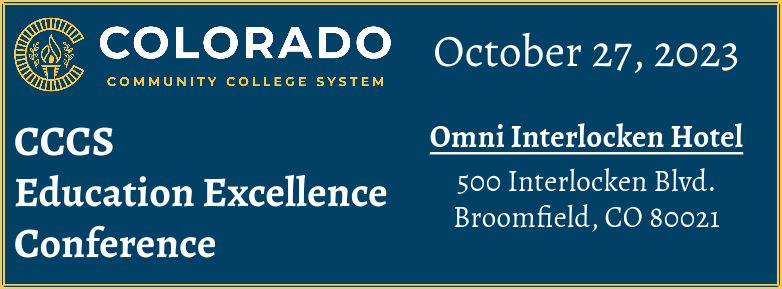Zoom links can be found next to each session title. Hover over and click “Zoom Link”
Session 4 – 2:45-3:35pm
Lessons Learned: CNCC’s Efforts to Build a Community of Reflective Practice to Break Down Barriers and Open Up Opportunities | Zoom Link
Nicholas E. Swails, Colorado Northwestern Community College
This presentation will present the lessons CNCC’s E/I in the Classroom Committee has learned while forming a Community of Reflective Practice to close equity gaps and build inclusive classrooms. As a small rural institution, CNCC has found ways to foster this community to promote an inclusive and welcoming classroom environment based on classroom observations by Teaching Fellows who foster culturally responsive and aware teaching practices by supporting the personal and professional growth of faculty. Additionally, we will share some of the challenges we have faced in gathering student demographic data (Pell-eligible, First-Generation, and Student-Athletes) from Institutional Effectiveness and analyzing student success, retention, and satisfaction rates from that disaggregated data.
Nicholas E. Swails is Associate Dean of Arts and Sciences, and Director of eLearning at Colorado Northwestern Community College. He joined the faculty at CNCC in Spring 2017 as an Instructor of History and Humanities. In addition to his administrative and teaching responsibilities, Nicholas is CNCC’s OER Ambassador and active in the institution’s DEI efforts to foster a safe campus community to grow student success and satisfaction. Before coming to Rangely and CNCC, Nicholas taught History and Humanities at Front Range Community College.
Creating Community Using Personalized Videos | Zoom Link
Mike Coste, Western Nebraska Community College
Videos are a great way to personalize online courses. This is important, not only because it can make the instructor more accessible to students, but can also contribute to a sense of belonging and community building. In addition, those of us who supervise multiple people, especially remotely, can use the same strategy to build a connection with our staff. In this session, we will discuss strategies for using videos to build community and a sense of belonging.
Mike Coste is currently the Dean of Arts, Sciences, and Online Learning for Western Nebraska Community College. Prior to that, he served as Dean of Instruction at Red Rocks Community College for nine years and Philosophy Faculty at Front Range Community College for about 20 years. He has taught online for Front Range, Red Rocks, Regis University, and CCCOnline.
Holistic Assessments: A more equitable and inclusive way to assess student learning and assign grades | Zoom Link
Mark Hussey, Front Range Community College
For too long, we have overlooked the negative impacts that traditional, points-based grading practices have, not only on student learning, but also the inclusivity and equity of our learning environments. A growing body of research insists that points-based grading practices are outdated and harmful, but what do we do instead? This presentation proposes holistic assessments as a better – more accurate, more inclusive, and more equitable – means of assessing learning and assigning grades. Participants will gain the tools needed to go “point-less” in ways that promotes learning, fosters inclusivity and creates more equitable opportunities for achieving and demonstrating learning outcomes.
Mark Hussey, English Faculty and Online Instructional Coach at Front Range Community College. I started experimenting with “point-less” grading schemes about 4 years ago after reading Asao Inoue’s Labor-Based Grading Contracts and Peter Elbow’s essay, “Ranking, Evaluating, Liking: Sorting Out Three Forms of Judgment.” Working as an instructional coach for the last year, I’ve very much enjoyed being able to research, read, and continue experimenting with new models of grading. Come to my session, let’s talk about making grading more equitable and inclusive!
Unpacking QM+ Standards | Zoom Link
Veronica Koehn, Ph.D, Northeastern Junior College and Amanda Hardman, CCCOnline
Quality Matters Plus (QM+) is the set of online course design standards that informs the Healthy Course Checklist (HCC) recommended to Colorado Online @. As a flexible growth-mindset tool, the success of the HCC depends on self-review and peer review practices to celebrate strengths and embrace opportunities for growth. In this session, we will highlight selected QM+ standards and explore the rationale and impact of each from the learner perspective. This session focuses on the information that we will apply in the second, practical session that follows.
Veronica Koehn, Ph.D., is the Director of Academic Excellence at Northeastern Junior College. She has a passion for assessment, and she coordinates the assessment efforts at NJC. Her love for assessment has dovetailed nicely with her work on the Base Standards deliverable group for the Learning Design Subcommittee for Colorado Online @, which created the Healthy Course Checklist. She has enjoyed learning more about and receiving certifications in Quality Matters and drawing out connections between the Healthy Course Checklist and Quality Matters.
Amanda Hardman is a CCCS learning designer as well as an adjunct instructor. She teaches English with CCCOnline and a course on Universal Design for Learning with University of Denver. She is part of the Learning Design subcommittee for Colorado Online @ and the work group that developed the QM+ standards and the Healthy Course Checklist.
